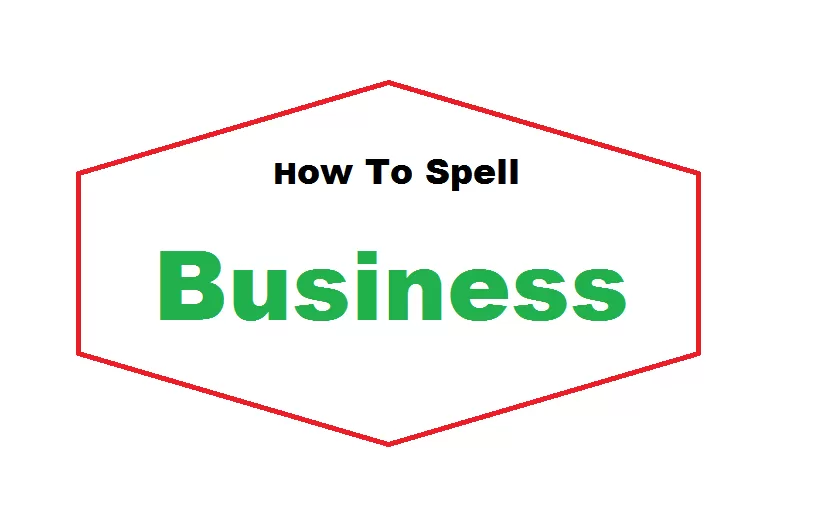How To Spell Business
When spelling the word “business,” there are a few things to remember. First and foremost, remember that the word is spelled with two ‘s’s and one ‘n.’ It is easy to accidentally switch the order of these letters or add additional ones, but doing so will result in a misspelling.
One helpful trick for remembering how to spell “business” is to break it down into its syllables: “bus-i-ness.” it can help you remember the correct order of letters and avoid common spelling mistakes.
Another thing to consider when spelling “business” is whether or not you are using any prefixes or suffixes. For example, if you add -like or -man at the end of business (i.e., business-like, businessman), ensure that you still maintain the correct spelling of the base word.
Mastering how to spell “business” may seem like a small detail, but it can make a big difference in how professional your written communication appears. Double-check your spelling and use tricks like breaking down syllables if needed.
Spelling rules
First and foremost, it is important to remember that “business” contains two Ss. It is a common mistake, as many people only include one S in the word. Additionally, it may be helpful to remember that the word “busy” also contains a Y at the end, whereas “business” does not.
When adding suffixes such as -ment or -ness to the end of “business,” it is important to remember that the spelling remains unchanged. For example, “businessman” would still contain both S’s even with the addition of -man at the end.
Another tip when spelling “business” is to break the word into smaller parts and focus on each syllable individually. It can help prevent common errors, such as switching around letters or forgetting certain vowels.
While there are some tricky aspects to spelling “business,” following these simple rules and taking your time can ensure proper spelling every time.
Commonly misspelled words
One of the most frequently misspelled words in English is “business.” Often, people forget to add the second “s” or mistakenly replace it with a “c.” It’s a tricky word because although it sounds like a “c” should be in it; it’s spelled with two “s’s.”
Another frequently misspelled business-related word is “entrepreneur.” Many people struggle with this one because of its unusual spelling and French origin. It’s important to remember that there are three Es and only one R in this word.
Lastly, the word “receive” is also commonly misspelled. People often mix up the placement of the E and I or forget about the silent E at the end. Remembering that I before E except after C can help avoid these mistakes.
What are some tips for spelling the word business correctly?
Ideally, knowing how to spell “business” is essential for presenting a professional image in written communication. Here are some tips to help you get it right every time:
- Remember that the word starts with “b-u-s-i,” not “b-u-z.” Many people mistakenly write “bizness.”
- Pay attention to the number of syllables (two) and where the stress falls (on the first syllable). It can help avoid misspellings like “busyness” or “buisness.”
- If you’re unsure about the spelling, try breaking the word into smaller, more familiar parts: bus-i-ness.
By keeping these tips in mind and practicing regularly, you can improve your spelling skills and avoid embarrassing mistakes in your writing.
What are some other commonly misspelled words?
Apart from “business,” several other commonly misspelled words may confuse written communication. One such word is “definitely,” which is often mistakenly spelled as “definately” or “defiantly.” Another tricky word is “accommodate,” which can be confusing due to its double c and double m.
Other frequently misspelled words include “embarrassment,” which often gets an extra r, and “maintenance,” which can trip people up with its placement of vowels. Many also struggle with the word “separate,” often spelling it as “seperate.”
In addition, there are some homophones (words that sound alike but have different meanings) that people commonly mix up. For example, many confuse “they’re” (they are) with “their” (belonging to them) or even “there” (indicating a place). Similarly, people may mistake “your” (belonging to you) for “you’re” (you are).
To avoid spelling errors, it’s helpful to pay close attention to the letter combinations and sounds of each word. Utilizing spell-check tools can also be beneficial in catching any mistakes before submitting written work.
The business letter: A guide to correct spelling.
In the world of business, spelling errors can be costly. A misspelled word in a business letter or email can damage your credibility and hurt your chances of making a good impression on potential clients or partners. To avoid this, knowing how to spell common business words correctly is essential.
One of the most important things to remember when writing a business letter is that accuracy counts. The tone of the message and the content are equally important, but if there are typos or errors, they can detract from what you’re trying to say. Common mistakes include misspelling words like “accommodation,” “liaison,” and “entrepreneur.” Make sure you double-check any unfamiliar terms before sending out your message.
Another tip for correct spelling in a business letter is to use software tools like Grammarly or Microsoft Word’s spell-check feature to catch any errors before you hit send. These programs can help you identify commonly confused homophones like “there” versus “they are” and even flag industry-specific jargon that typical spell-checkers may not recognize. By taking these extra steps for accuracy, you’ll ensure your message comes across as professional and polished every time.
frequently asked questions
What is the correct spelling of “business”?
The correct spelling of “business” is b-u-s-i-n-e-s-s.
Is there any other way to spell “business”?
No, there is no other way to spell “business.” However, it is a commonly misspelled word due to its length and complexity.
What are some common misspellings of “business”?
Some common misspellings of “business” include bussiness, buisness, and busines.










